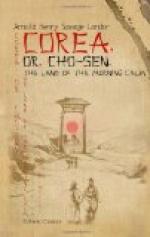The Corean mind seems to lay great stress upon the quantity of food that the digestive organs will bear. Nothing gives more satisfaction to a Corean than to be able to pat his tightly-stretched stomach, and, with a deep sigh of relief, say: “Oh, how much I have eaten!” Life, according to them, would not be worth living if it were not for eating. Brought up under a regime of this kind, it is not astonishing that their capacity for food is really amazing. I have seen a Corean devour a luncheon of a size that would satisfy three average Europeans, and yet after that, when I was anxiously expecting to see him burst, fall upon a large dish of dried persimmons, the heaviest and most indigestible things in existence. “They look very good,” said he, as he quickly swallowed one, and with his supple fingers undid the beautiful bow of his girdle and loosened it, thus apparently providing for more space inside. “I shall eat one or two,” he murmured, as he was in the act of swallowing the second; and, in less than no time the whole of the fruit had passed from the dish into his digestive organs, and he was intently gathering up, with the tips of his licked fingers, the few grains of sugar left at the bottom of the dish.
“I was unwell and had no appetite to-day,” he then innocently remarked, as he lifted up his head.
“Oh, I hope you will come again when you are quite well,” said I, “but you must promise not to eat the table, because it does not belong to me.”
A good deal of the native voracity is due, however, not to this insatiable appetite and gluttony alone, but also to Corean etiquette, according to which it shows a want of respect to the host and is a mark of great rudeness not to eat all that is placed before one. If all is not eaten they argue that you do not like it and consider it to be badly cooked or inferior to what you have at home. The notion of a normal capacity is strange to them, and never even enters their mind. They are trained from childhood to eat huge quantities of food, and to take heartily all that they can get. I have seen children with thin little bellies so extended after a meal, in the course of which they had been stuffed with rice and barley, that they could hardly walk or even breathe. I recollect on one occasion remarking to a mother, who was beamingly showing me her child in a similar condition: “Are you not afraid that his skin will give way?” “Oh no! Look!” Upon which she stuffed down his little throat three or four more spoonfuls of rice. I have been thankful ever since that I was not born a Corean child.
When the Coreans eat in their own houses, the men of the family take their meals first, being waited on by their wives and servants; after which the females have their repast in a separate room. The women seldom drink intoxicants, and have to be satisfied with water and rice-wash.
It is the duty of the wife to look after the welfare of her husband, and when she has fed him, and he has drowsily laid himself down on the ground, or on his little mattress, as the case may be, she retires, and after having had her food either goes to see her friends or to wash her master’s clothes, or else goes to sleep.




